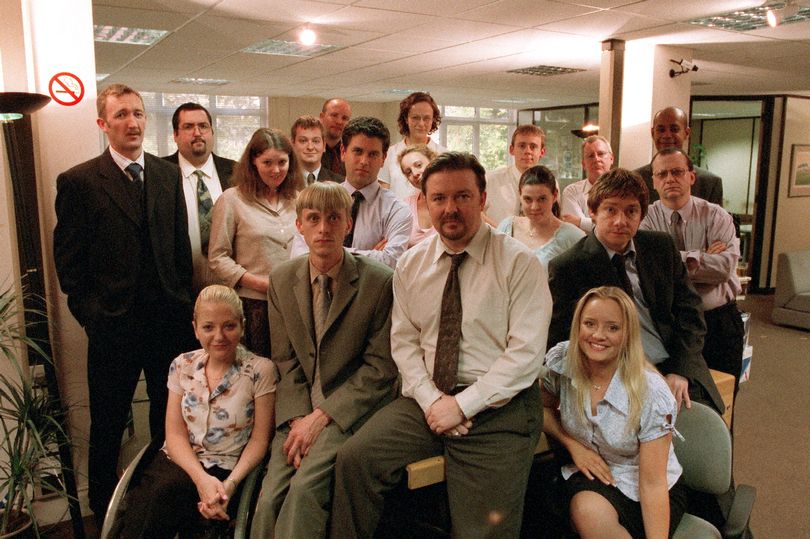Revolutionary mundanity: ‘The Office’ at 20
In this age of streaming services, from Netflix to Disney+, TV series are churned out on an industrial scale, with thousands of episodes in various genres at your fingertips. Therefore, the fact that the 20th birthday of one particular series is being remarked upon, let alone celebrated, is something of a miracle, highlighting the genius that is the UK version of The Office.
Few people watched the first episode of The Office when it came out on 9 July 2001. Throughout its entire first season, it only attracted a cult following, and few expected a second instalment. With the second series, however, it boomed. The revolutionary brilliance of this mockumentary was disseminated through the nation via word-of-mouth. At its core, the format is as (intentionally) mundane as you could imagine. A documentary team records the daily goings-on at a typical workplace, interviewing personnel, and attempting to get a sense of its day-to-day running.
In this mundanity, creators Ricky Gervais and Stephen Merchant saw gold. Through this format, they realised that characters could reveal themselves to the audience as they play-up and react to the cameras. “That was what was interesting to us; how does having a camera trained on you affect the way you present yourself to the world,” commented Merchant, and it was this concept that gave us such characters as Gareth (Mackenzie Crook), Tim (Martin Freeman), Dawn (Lucy Davis), and of course David Brent (Ricky Gervais). The series effectively follows these four characters – especially Brent as his supremely cringe-worthy character emerges.
Brent classes himself as an entertainer first, boss second, and it’s in his attempts at ‘comedy’ that the hilarity of the series emerges through his actions, interviews, and one-liners. Episode four of series one is a case in point, which Gervais classes as his favourite. Brent attempts to lead a training-day session for the office, creating hilarious and infamous lines, before he eventually gets out his guitar and strums out a few of his songs, as he is “desperate for attention”. Give it a watch and see how long you can maintain a straight face.
Things will go badly, and a boss like Brent is bound to fail, and the show realises that in a brilliant way, trumping the US version’s constant, unrealistic good-naturedness
This episode’s down-beat tone is largely maintained throughout series one, as Brent is the “chilled-out entertainer” of his dreams, before the stress levels ramp up through the potential closing down of the branch in series two. This stress has created more debate surrounding series two, as for those seeking simply a comedic fix, it may not fit the bill. As Brent’s situation worsens and his façade for the cameras starts to fail, the cringe-worthiness of the character means that the episodes, though still hilarious in places, steadily become almost unwatchable (Gervais is brilliant as a desperate Brent clinging on to his job).
However, this aspect of The Office UK only increases its brilliance. The whole point of the mockumentary format is that it replicates real life as much as possible, and that’s what Merchant and Gervais most sought to achieve, with their shaky camera-work and dying pot plants. Things will go badly, and a boss like Brent is bound to fail, and the show realises that in a brilliant way, trumping the US version’s constant, unrealistic good-naturedness.
One of the bright spots of a largely dark series two is the ever-burgeoning relationship between Dawn and Tim. Richard Curtis has ascribed the Dawn-Tim relationship as “one of the greatest romantic stories of all-time”, and it’s the subtlety of their relationship that makes this the case. Gervais says that “Tim and Dawn make it grounded … they make it matter”, and this is certainly true, as in an office of odd-balls, from scotch-egg chewing Keith to territorial-army recruit Gareth, these two are ‘normal’ friends who the audience can identify with, joking and laughing naturally away from the ‘comedy-genius’ Brent.
It’s intentionally not binge-worthy, as each episode is meaningful, tackling difficult themes, all of which desire full attention from the viewers
Their true feelings, however, are only revealed by their glances at each other from their respective desks, and it’s these glances that only the mockumentary format can reveal. Their coming together is always just out of reach, primarily prevented by Dawn’s fiancée Lee, but it’s this restraint which ultimately makes the ending of the series so good.
After the two series, The Office is rounded off by two hour-long Christmas specials, both of which are brilliant, bringing the humour and cringe-worthiness of the first two series together into a perfect whole. Dawn and Tim’s relationship climaxes, and though in many ways it comes to the obvious ending, it’s executed perfectly. The writing, acting, and soundtrack are all superb and bring tears to the eyes, something that is usually difficult in a simple love story.
Ending with these Christmas specials, criticism levelled at the series is that, compared to the US equivalent, it’s too short, containing only 14 episodes compared to the US’s 201. However, the UK version focuses on quality rather than quantity. It’s intentionally not binge-worthy, as each episode is meaningful, tackling difficult themes, all of which desire full attention from the viewers. Gervais could very easily have continued this cash cow, but didn’t want to spoil something so good: “To try and assemble The Office again would be shameful. Why would they be there? … It works because it’s done.”
And this is what has made the show so revolutionary and enduring: its realism. From the first series’ comfort to the second’s cringiness, all is identifiable to an audience seeking an escape from their reality. At one point Brent claims that he wants to “live fast, die old”. The Office certainly lived fast: it was over and done within two years. But, as it’s only 20, its brilliance means that it certainly has a few years of life and laughter left in it yet.

Comments